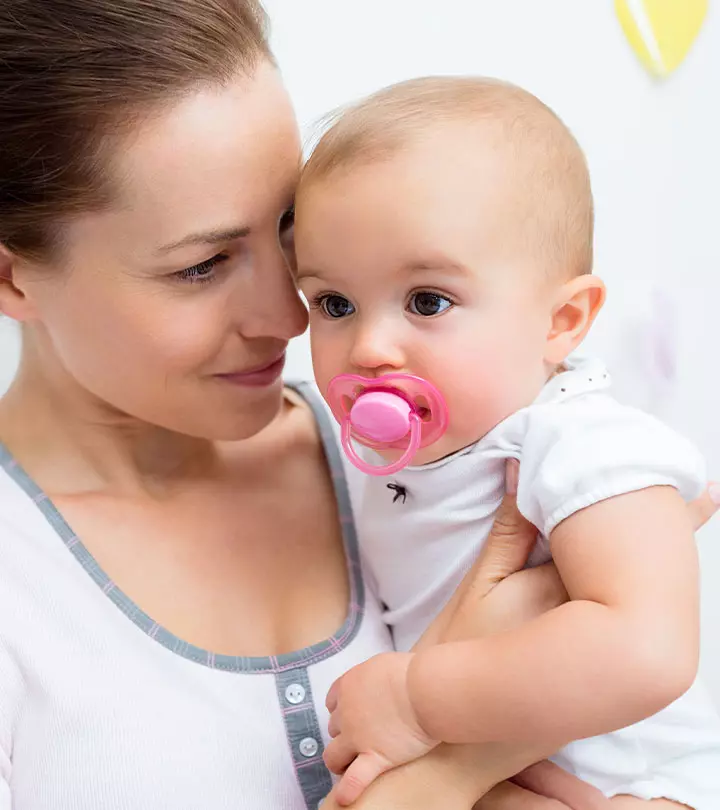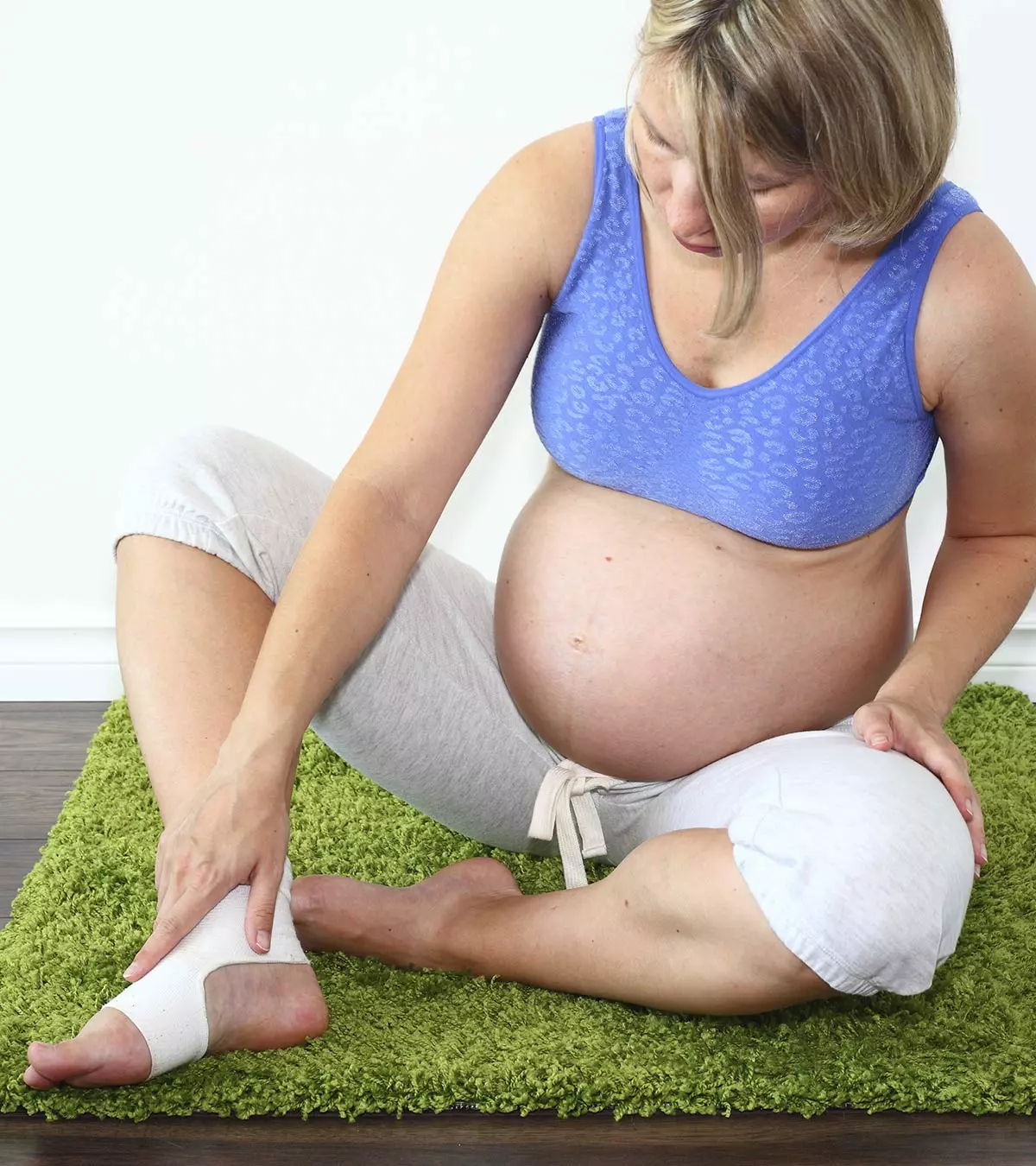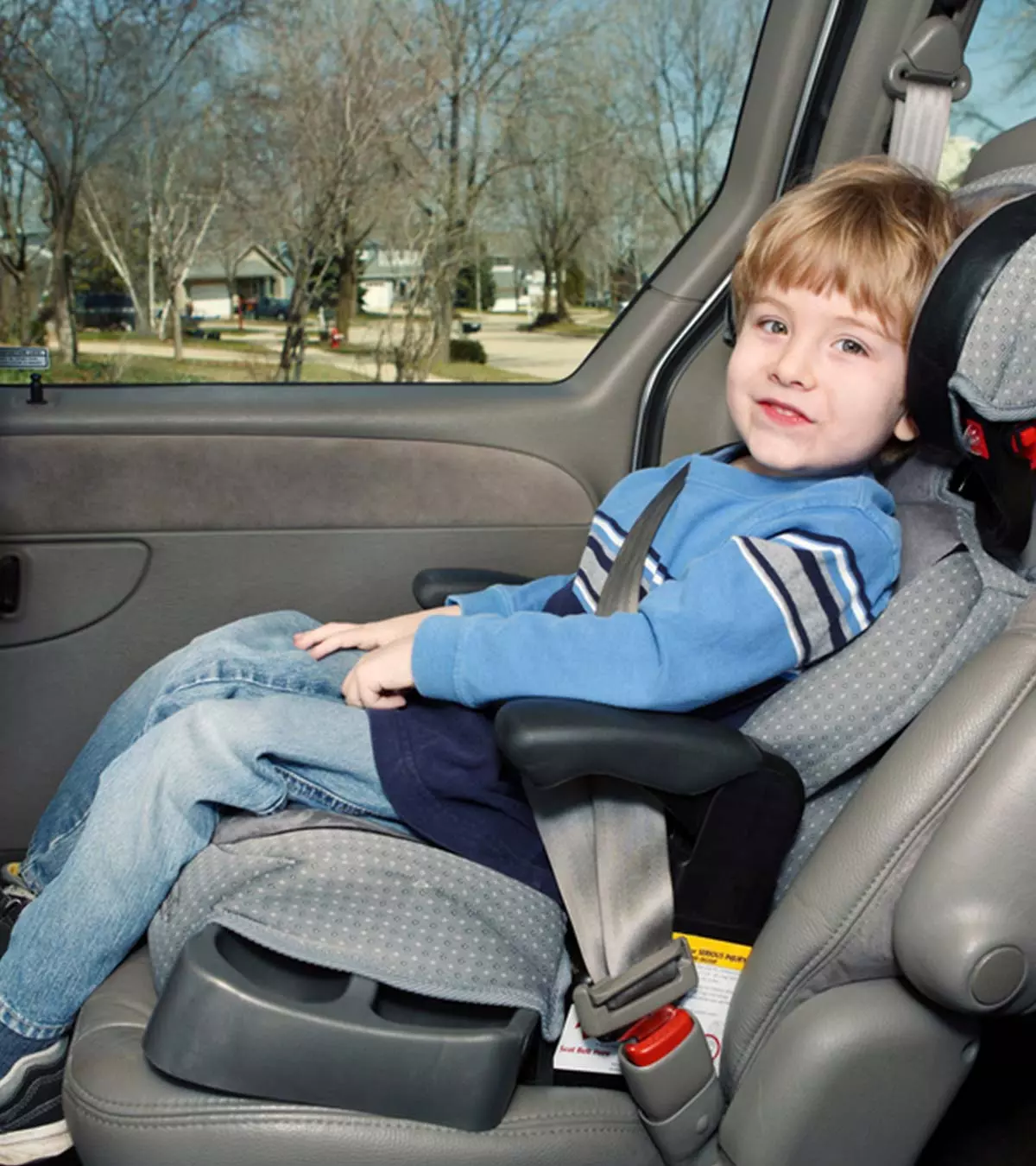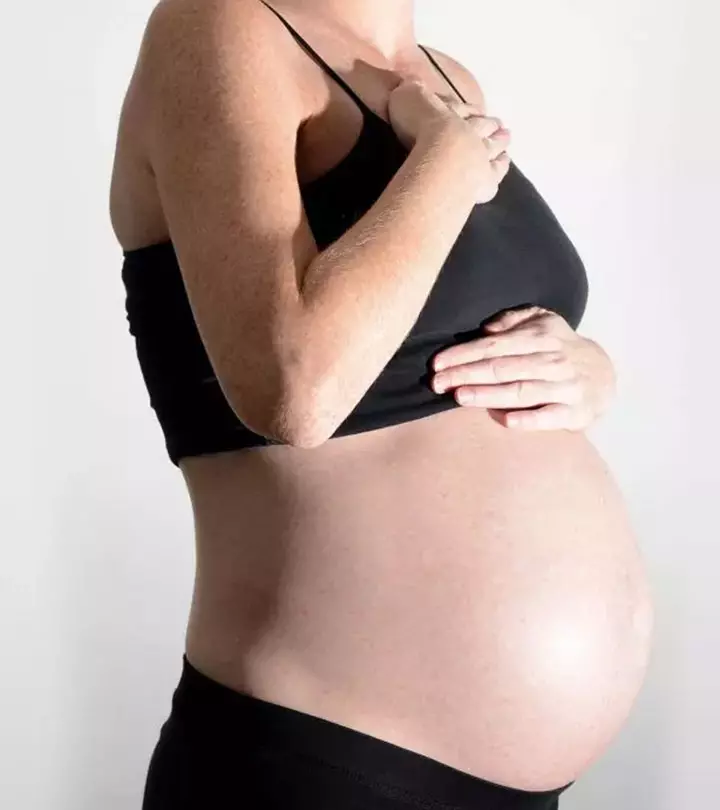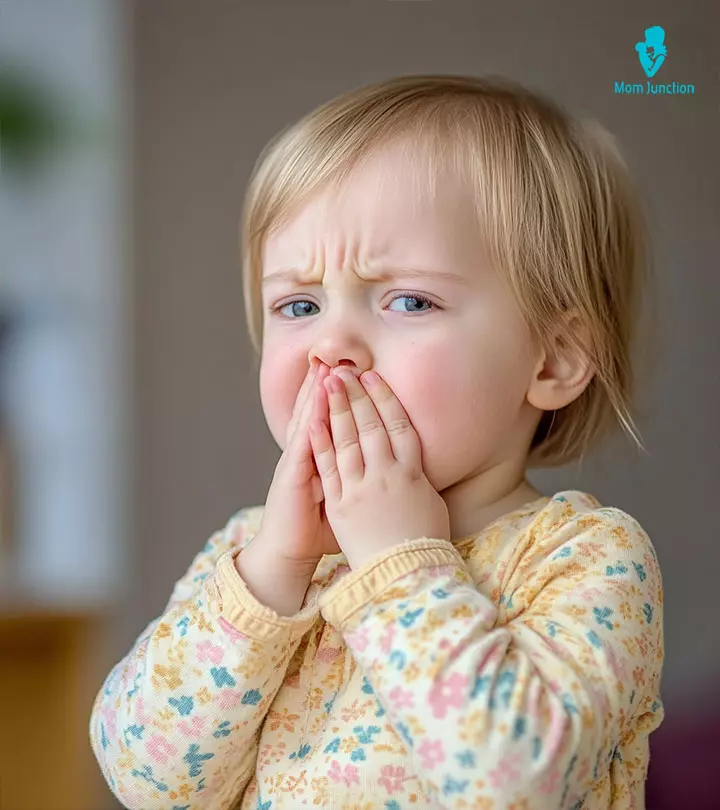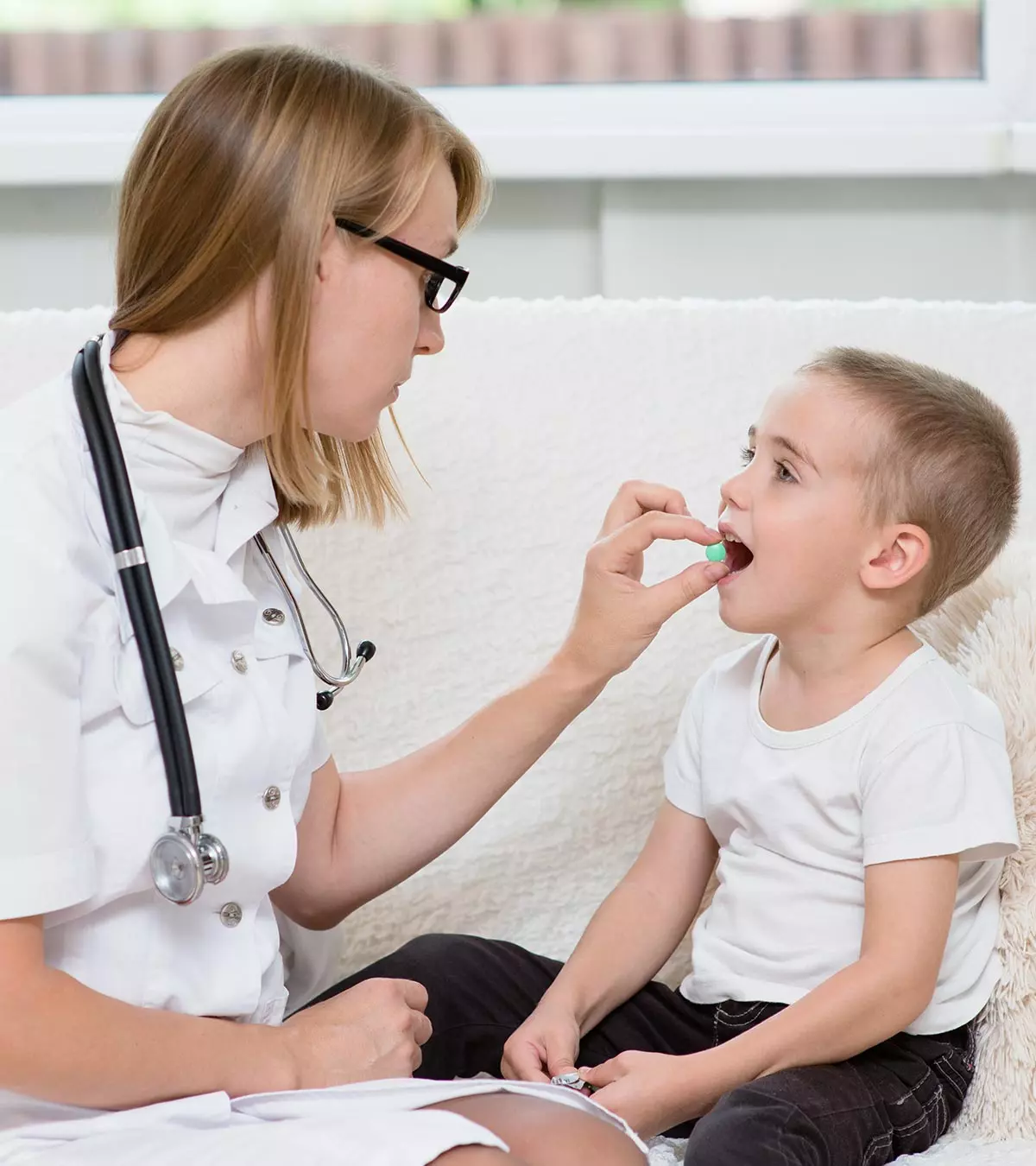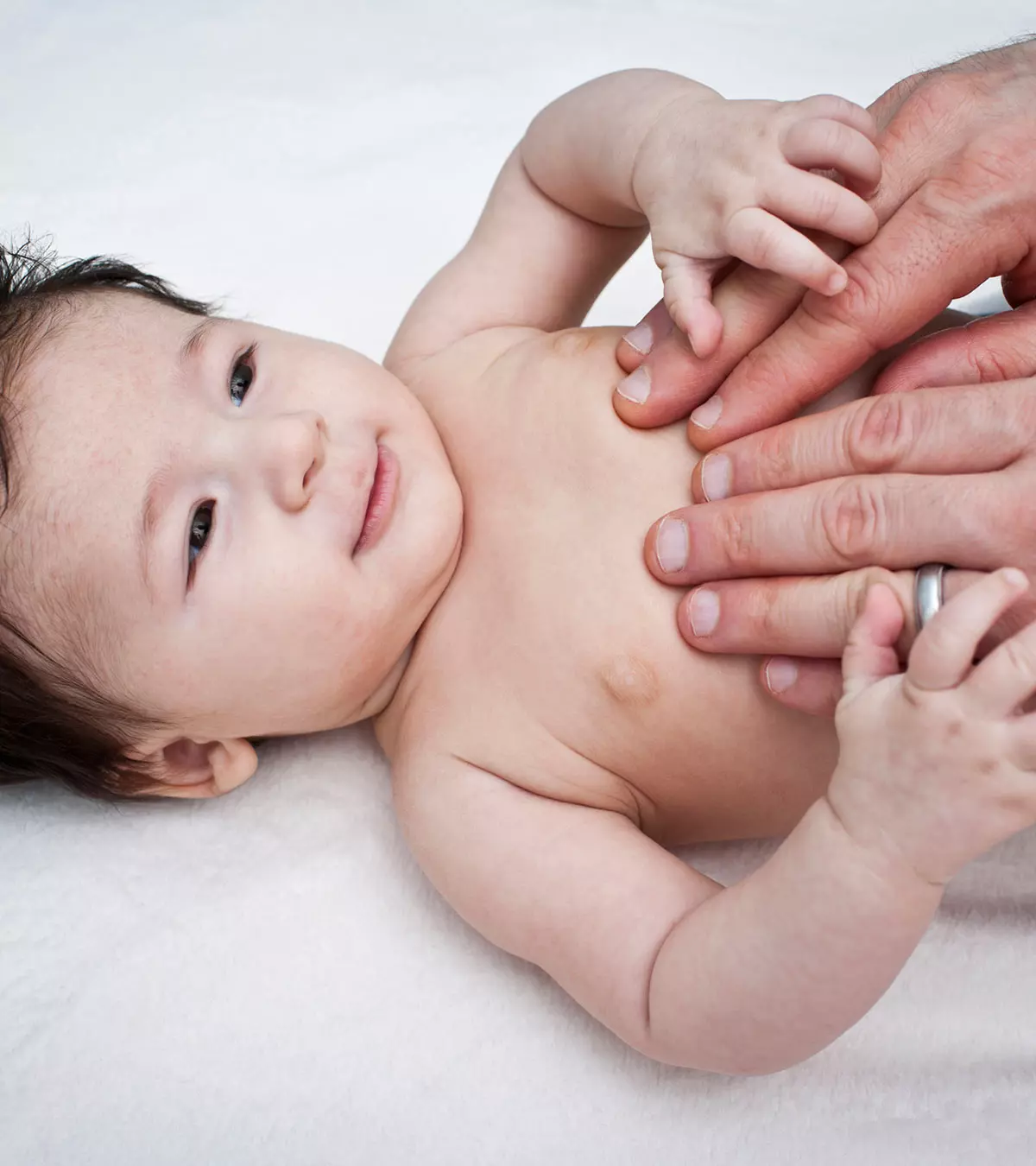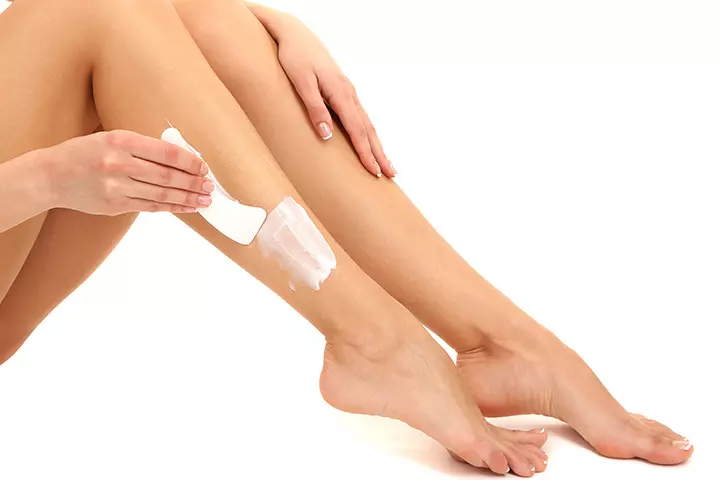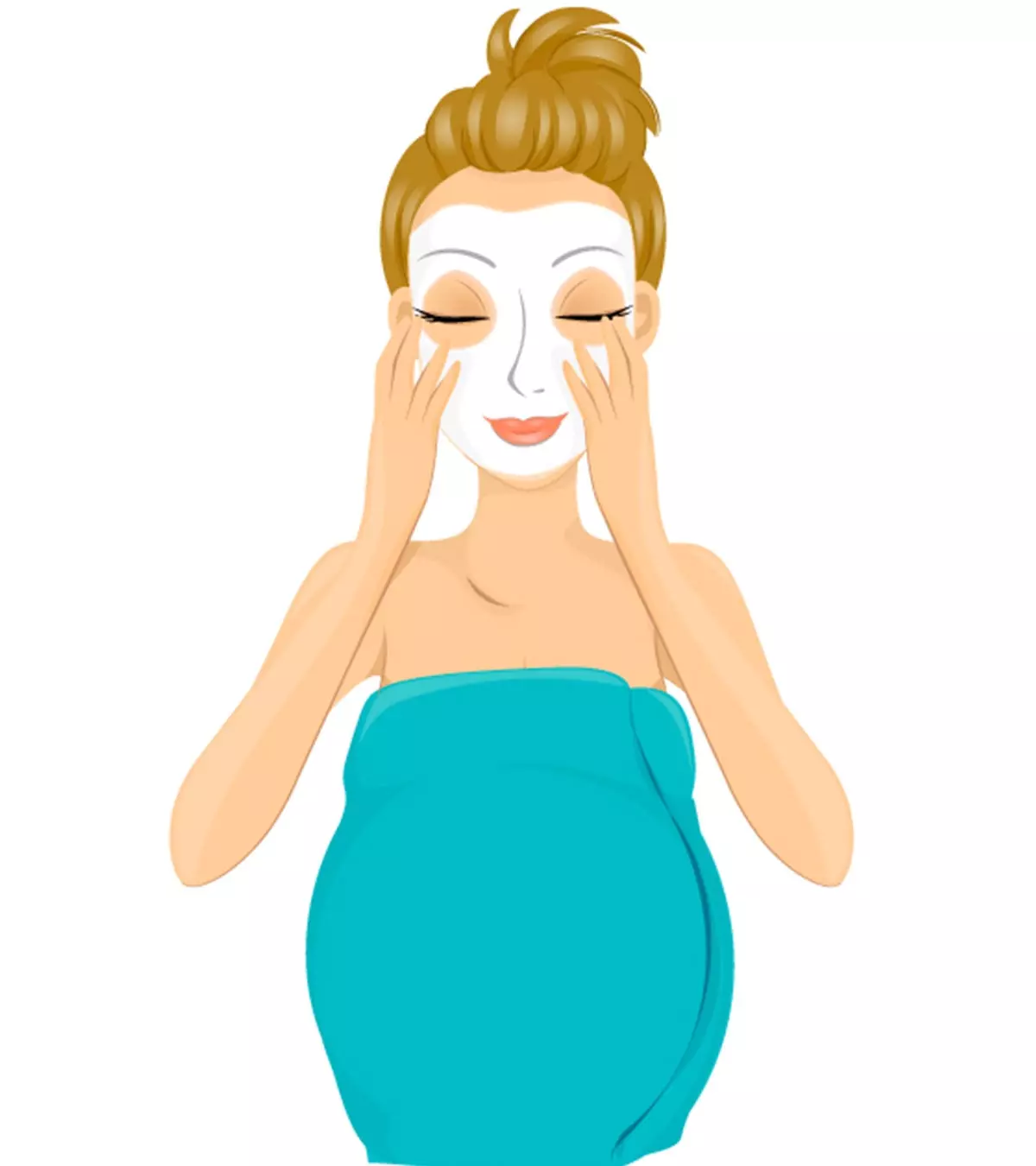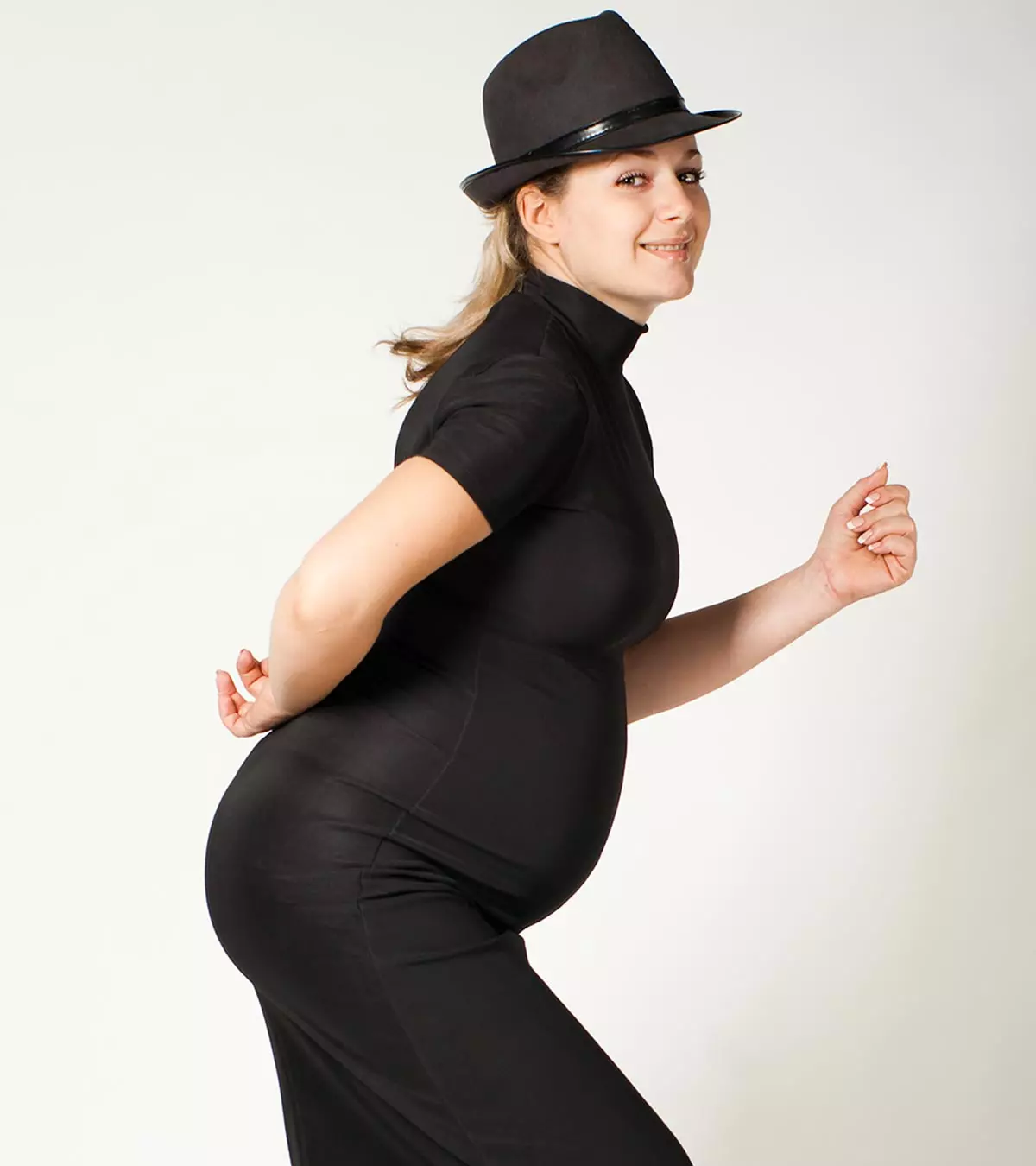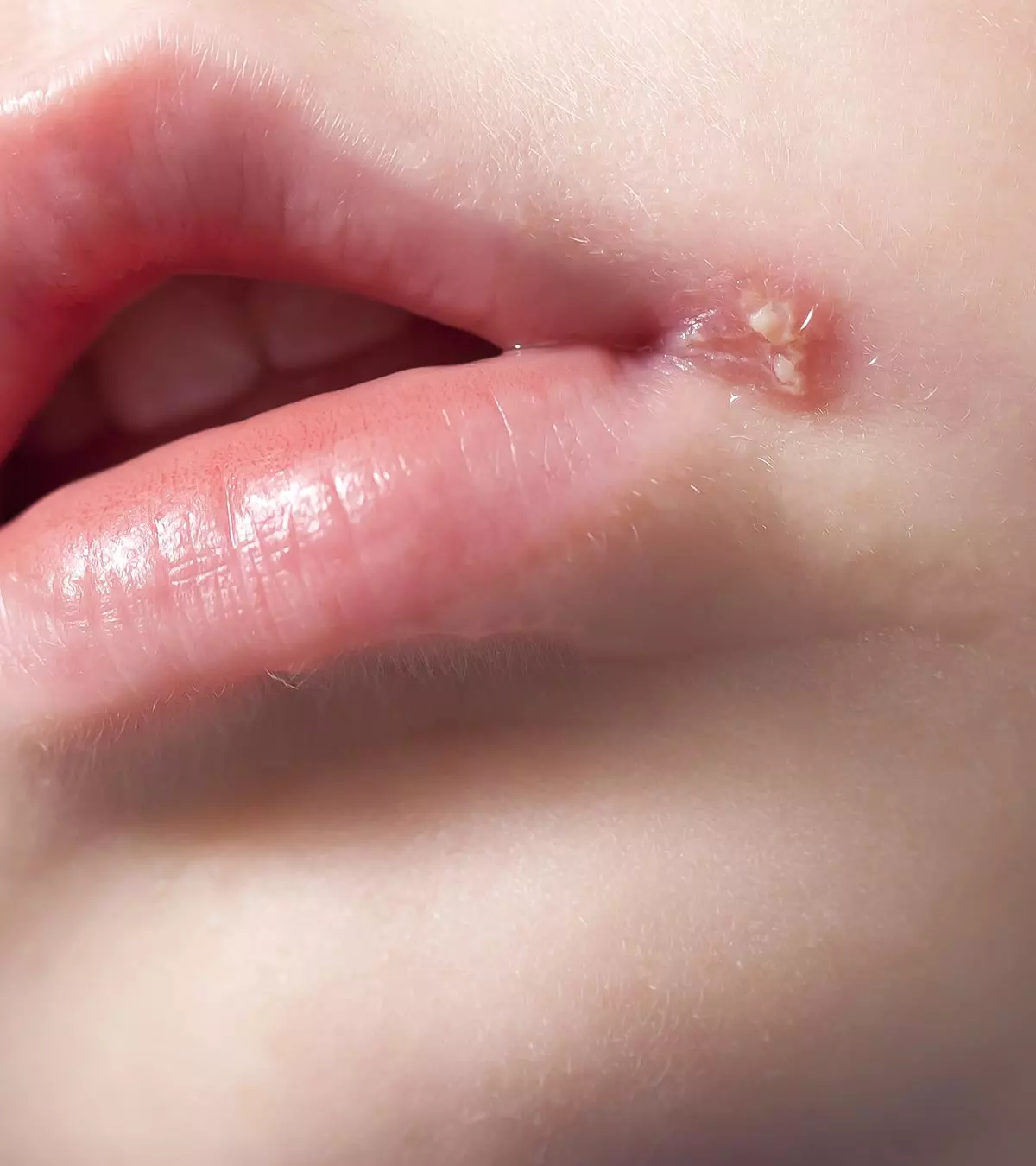
Cold sores in babies are the blisters that appear around the lips. Although they are called cold sores, they do not cause a cold. They are named so because they might at times cause fever in babies. Most parents often confuse these sores with an allergy or a bacterial infection. But they are caused by a virus instead. Cold sores can cause significant discomfort and potential complications in infants. Understanding their causes and how to manage them is essential for your baby’s well-being. Read on to know about cold sores, their causes, signs, diagnosis, treatment, and prevention techniques.
Key Pointers
- Cold sores are blisters or sores caused by a virus and are often accompanied by a fever.
- They can be contracted by contact with an infected person, sharing utensils or clothing, or during birth if the mother has genital herpes.
- Cold sores in babies are diagnosed with the help of a physical examination, a blood test, and analyzing the sore scrapings.
- They are typically treated by a doctor with oral antiviral medicines, antiviral creams, and antipyretic medicines.
- An immediate medical attention is warranted if a baby is unconscious, has a high fever, loses appetite, has seizures, or swollen lymph nodes around the throat.
What Is A Cold Sore?
Cold sores are tiny blister-like sores that appear around the lips or mouth. These sores are filled with a clear liquid that could ooze when the blister breaks. Fever often accompanies cold sores, and for that reason, they are also called fever blisters (1).
What Causes Cold Sores In Babies?
Cold sores, also known as oral herpes, are primarily caused by the herpes simplex virus type 1 (HSV-1). HSV-1 is the type of virus that commonly causes infections in the mouth. A related virus called the herpes simplex virus type 2 (HSV-2) can also cause cold sores, although HSV-2 is usually responsible for sores in the groin region (genital herpes) (2). Cold sores due to HSV-2 are quite rare, and it is HSV-1 that is mostly responsible for the illness (3).
How Can A Baby Catch The Cold Sore Virus?
An infant can catch the herpes simplex virus (4) (5) (6):
- Through contact with an infected person’s lesion. The virus is mostly spread through direct contact with an infected person’s lesion. It occurs when an infected parent or a sibling kisses the baby.
- Sharing utensils. The virus may transmit through the saliva even if the infected individual does not have any cold sores. The herpes virus could spread about 24 to 48 hours before the first emergence of a cold sore. It means an infected parent or sibling may unknowingly pass the virus through the saliva by sharing a utensil with the baby.

- During birth. If the mother had genital herpes, then she can pass on the dormant HSV-2 virus to the baby during delivery, via the birth canal. Based on research by the MetroHealth Medical Center and the University of Florida, neonatal HSV infection occurs in approximately 1 in 3000 to 1 in 20,000 live births (7).
- Sharing washcloths and towels. The virus can latch onto a washcloth or towel from a cold sore and then pass to the next person who uses it. A baby can catch the virus if they share a towel with a parent or sibling.
The herpes virus can stay dormant for very long, so you may not even know you are carrying the virus.
So, parents may unknowingly pass the virus even if they do not have any symptoms of the condition.
What Are The Symptoms Of Cold Sores In Babies?
The virus has an extended incubation period, and the symptoms may not emerge for as long as 2-12 days after contracting the virus.
Newborns who contracted the virus during birth will display the symptoms within the first four weeks. The symptoms depend on the baby’s overall health. Common symptoms of cold sores in babies include (8)(9):
- One of the main symptoms of cold sores is the presence of baby lip blisters. Tiny, yellowish blisters around the lips appear in a cluster around the lips. You could notice blisters on the cheeks, above the upper lip, on the chin, eyes, and even on the lips.
- Repeated itching of the lips. The baby may try to scratch the itchy, tingling, and painful sores or the area around them. Older toddlers may point to the sore to indicate pain or discomfort in the area.
- The baby’s mouth may feel sore.
- They may have a low-grade fever of around 100 °F (37.7 °C).
- Cold sores around the lips make eating and drinking painful for the baby. So the little one will show poor interest in eating, breastfeeding, or formula feeding.
- The baby may appear less energetic than before and have chronic lethargy.
These symptoms could last for a few days to up to three weeks, depending on several factors like the severity of the infection and the baby’s age. The symptoms are seldom dangerous, but in the case of newborns and infants with weak immunity, the symptoms may be severe.
When To Take The Baby To The Doctor
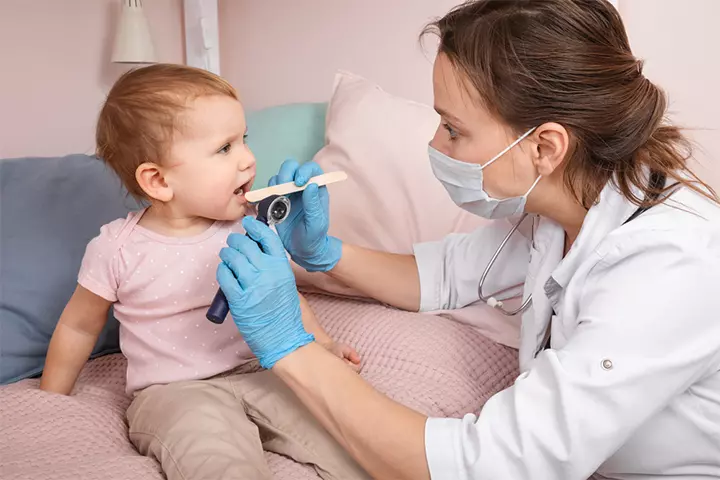
Take your baby to the pediatrician right away if he/she displays the following symptoms along with a cold sore (9):
- High fever, with a temperature of 100.4 °F (38 °C) or above (10)
- Unconsciousness
- Disinterest in eating to the extent that the baby does not eat or drink anything at all
- SeizuresiAn abnormal and rapid electrical activity in the brain
- Swollen lymph nodes around the throat
- Lack of energy and unresponsiveness
- Difficulty waking up from sleep
- Breathing difficulties or grunting
- Rapid breathing
- CyanosisiA bluish or purplish discoloration of the skin, lips, or nail beds caused by poor oxygen levels in the blood
The doctor may look at these symptoms and more before diagnosing cold sores.
How Are Cold Sores In Babies Diagnosed?
The following steps let the doctor accurately diagnose the condition (11):
- Visual inspection: Most doctors will diagnose the disease by mere examination of the cold sore blisters and their location on the body.
- Sore scrapings: A small scraping of the cold sore or the fluid from an oozing sore is collected and sent for laboratory analysis to detect the presence of a virus.
- Blood test: If the above methods are inconclusive, then the doctor may recommend a blood test to detect the virus in the blood.
- Family history: The doctor may also discuss any history of cold sores in the family.
If the test results are positive for sores, then the doctor will suggest a suitable treatment. Additional tests, such as blood work, liver and kidney function tests, or imaging scans like X-rays or MRIs, may be done to assess the overall health of the baby and check for any complications. An eye examination is also necessary to rule out any impact on vision.
How Are Cold Sores In Babies Treated?
There is no specific treatment for cold sores, and medication mainly aims at reducing the intensity of the symptoms and minimizing the spread of the virus to healthy cells (12). Usually, the immune system subdues the virus by itself.
Medication could be needed in cases where the infection is severe, the baby is premature, is a newborn, or is unable to cope with the disease due to weak immunity. Medicines that are commonly prescribed for the treatment of cold sores include (11)(13):
- Oral antiviral medicines such as Acyclovir, Famciclovir, and Valacyclovir. The doctor decides the dosage of these medicines after assessing the baby’s symptoms.
A study funded by the National Institute of Allergy and Infectious Diseases highlighted the benefits of extended antiviral therapy. The report states, “Infants surviving neonatal HSV disease with CNS involvement had improved neurodevelopmental outcomes when they received suppressive therapy with oral acyclovir for 6 months (14).”
- Antiviral cream to slow the spread of the virus and hasten the healing process.
- Antipyretics to control fever, and antibiotics might be required in the case of secondary infection. Homeopathy can be useful in building immunity and hence works wonderfully for all sorts of viral infections. It also prevents recurrence.
In most cases, the baby may not require medications and will start feeling better with proper home care.
How To Manage A Baby’s Cold Sores At Home?
You can take the following steps to help the baby feel better right at home (13)(15)(16):
- Wash the sores periodically: Use a baby-safe antiseptic soap or body wash liquid and warm water to clean the sores regularly. It will prevent the spread of the virus and also fight away other opportunistic pathogens.
- Wash the hands of the baby regularly: Babies may touch the cold sores due to the tingling sensation they create. Since you can’t always stop the baby from touching the sores, wash the baby’s hands whenever you wash the sores. This also helps maintain basic hygiene and prevent the contraction of other diseases.
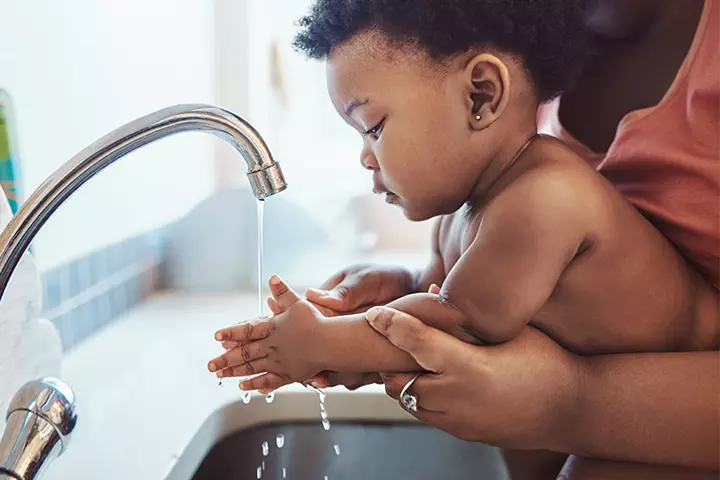
- Use an ice pack on the sores: Apply an ice pack on the sore for a few minutes to make the sores less painful or itchy. Remember to discard the ice pack later to prevent passing the virus to someone else.
- Use a washcloth dipped in warm water: If the baby finds the ice pack irritating, then you can use a washcloth dipped in warm water. Remember to use a clean washcloth that you can discard later.
- Wipe mouth with salt water: Babies tend to drool a lot. When wiping the mouth, use a cloth dipped in warm salt water solution to prevent the virus from spreading to the healthy skin around.
- Breastfeed more frequently: Research has found that antibodies in breast milk interfere with the virus’s ability to bind to healthy cells, making it harder for it to multiply and spread (17). Breast milk also stimulates the baby’s immune system to produce more immunoglobuliniAntibodies produced by white blood cells to destroy viruses and bacteria by binding to them A (IgA) compound that can fight the virus (18).
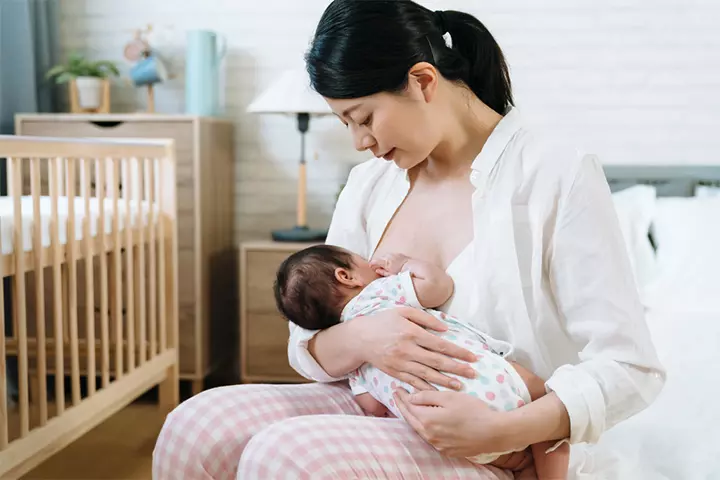
- Give pain medication after doctor consultation: If the irritation from the sores seems to bother the baby a lot, then you can give medicines such as acetaminophen (paracetamol) or ibuprofen. But do so only after consulting a doctor.
- Give cold liquids and soft foods: Offer your child cold drinks, ice, or frozen juice bars to soothe mouth pain. Stick to soft foods and avoid anything spicy or acidic. For children over one year old, provide plenty of water, milk, and popsicles, but avoid acidic juices like orange juice (19).
Cold sores heal in about three weeks (20). The virus seldom causes any problems beyond the sores, but in some cases may lead to complications.
 Quick tip
Quick tipWhat Are The Complications Of Cold Sores In Babies?
Cold sores may cause the following complications in babies (21):
- Encephalitis: The virus could reach the brain where it could cause latent infectioniCondition when the pathogen is lying dormant in the body with no visible symptoms . It can lead to a disease called encephalitis, which causes severe inflammation of the brain, eventually leading to seizures and other complications.
- HSV keratitis: When the baby touches the eye after touching or scratching a cold sore, the virus can pass to the eye and damage the cornea. In most cases, the damage is temporary. But in extreme cases, the baby could suffer blindness.
- Eczema herpeticum: Infants who already have eczemaiAn inflammation of the skin accompanied by itchiness and dryness and get cold sores run the risk of developing a complicated version of eczema called eczema herpeticum. The condition can be painful and takes a very long time to cure (22).
Complications are most likely to affect infants with weak immunity and those below the age of six months. So, as far as possible, try to prevent the infant from catching cold sores.
 Quick fact
Quick factHow To Prevent Cold Sores In Babies?
You can prevent cold sores in babies through the following methods (24)(25):
- Keep the baby away from infected individuals.
- Do not share any item with the baby. The baby’s items, including clothes, should be kept and washed separately.
- Avoid taking the baby to overcrowded places where the virus can spread quickly via skin contact.
- If you have cold sores, wear a nose and mouth mask while handling the baby. Wash your hands thoroughly with soap before handling the baby to prevent transmission of the virus.
- Take appropriate medication for cold sores during pregnancy. The baby runs the risk of catching the herpes virus during birth and medication can help prevent that.
- If your cold sores during pregnancy are not resolved, or you develop sores around the birth canal, then you can discuss with your doctor about having a cesarean delivery. It helps prevent the spread of the virus to the baby.
Prevention is the best way to keep the baby safe from HSV-1 and HSV-2. But if the baby gets infected, do they run the risk of having it again?
Can Cold Sores In Babies Recur?
Yes. The herpes virus can stay dormant within the nerve cells of the spinal cord and reinfect the body later. However, the re-emergence of cold sores is subject to external triggers. The following triggers may cause cold sores again (21):
- Stress, fatigue, and lack of sleep
- Illnesses like cold or flu and conditions like dehydration
- Injuries to the skin including cracks and breaks in the skin
- Poor nourishment
- Exposure to intense sunlight and heat
- Dry and cold weather
The virus continues to stay inside the body for the rest of the life, so there is always a risk. But the chance of recurrence also depends on triggers and general health of the child. So, avoid exposing the child to the triggers after he or she recovers from cold sores once.
 Quick tip
Quick tip Read on to know the answers to some commonly asked questions about cold sores.
Frequently Asked Questions
1. Can parents catch cold sores from a baby?
Yes. Cold sores are contagious, which means the virus can pass on from the baby to the others, especially the parents and primary caregivers. However, in adults, the cold sores may go away without any treatment. Nevertheless, it is important to shield yourself from the herpes virus so that you do not transmit the dormant virus to the baby later. The best way to avoid this condition is to take precautions such as wearing a mask every time you hold the baby and washing your hands after handling the baby.
2. What if I accidentally kissed the baby?
If you have a cold sore, then wash the part of the baby’s skin with antiseptic soap and warm water immediately. If your baby has a cold sore and you happen to kiss them, then do the same for yourself.
3. What is the difference between cold sore and canker sore?
Canker sores are mouth ulcers that can emerge anywhere on the mucous membrane of the mouth, including the inside of lips and cheeks. There are several reasons behind the eruption of mouth ulcers in infants or babies, from vitamin deficiency to virus attacks. However, canker sores are often associated with allergies and can be easily cured by washing with antiseptic and increasing the vitamin intake. Repeated sores can be an indicator of allergy, which can be diagnosed by a doctor (26).
4. How long are cold sores contagious?
Cold sores are contagious from as early as one begins to notice the initial symptoms, such as tingling and burning sensation, and continue to be so until the lesions are completely healed (27).
5. Is Vaseline good for cold sores in babies?
Petroleum jelly, such as Vaseline, has been believed to decrease the discomfort of the bumps as it keeps skin soft and prevents cracking and peeling. However, there is no medical evidence to ascertain Vaseline as a treatment option for cold sores (6).
6. Should I keep a cold sore moist or dry?
It would help if you kept the area around the sore moisturized to prevent it from peeling and drying (13).
Cold sores in babies can be treated with antiviral medicines or topical creams. But in case of symptoms such as high fever, seizures, and unconsciousness, it is advised to consult your doctor immediately. Ensure that you take proper care of your baby during this time and keep their surroundings clean. You should also periodically wash the affected area with a clean cloth and place an ice pack on the blisters for a few minutes to relieve itchiness and help your little one feel better.
Infographic: Effective Tips On Preventing Cold Sores In Babies
Cold sores often transmit due to direct contact or shared personal items of the infected person. Learn the practical steps to prevent the infection in the infographic below, and follow them when at home or outside to protect your little one from contracting cold sores. Illustration: Momjunction Design Team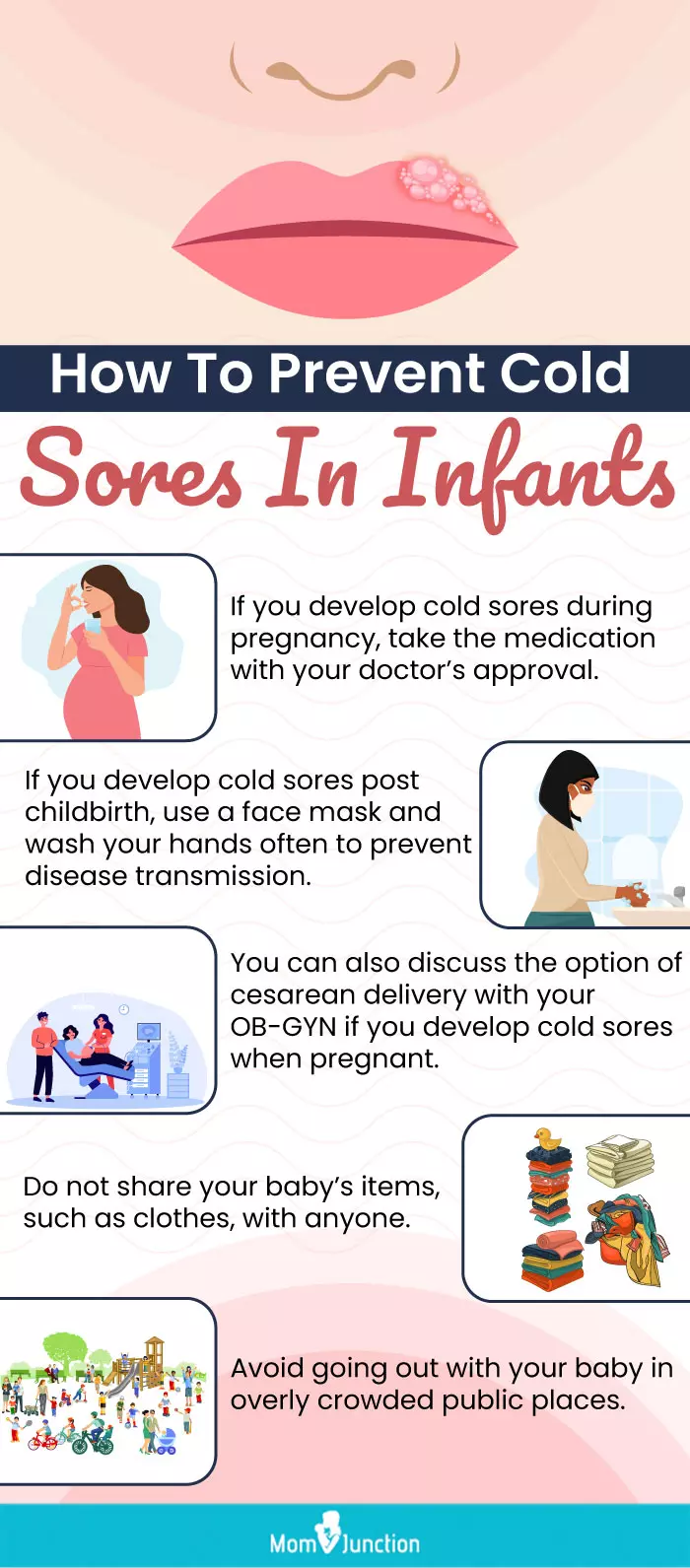
Cold sores can be dangerous to infants. Watch this video and learn how to protect your baby from this virus and its potential risks.
References
- Cold Sores.
https://medlineplus.gov/coldsores.html - Herpes – oral.
https://medlineplus.gov/ency/article/000606.htm - Cold Sores.
https://www.uhs.wisc.edu/medical/cold-sores/ - Cold Sores.
https://kidshealth.org/en/parents/cold-sores.html - Herpes Simplex Virus (Cold Sores) in Children.
https://www.urmc.rochester.edu/encyclopedia/content?contenttypeid=90&contentid=P02518 - Cold sores – questions and answers.
https://herpes.org.uk/cold-sores/ - Congenital Herpes Simplex
https://www.ncbi.nlm.nih.gov/books/NBK507897/ - Herpes Simplex Virus in the Newborn.
https://www.health.ny.gov/diseases/communicable/herpes/newborns/fact_sheet.htm - Neonatal herpes (herpes in a baby).
https://www.nhs.uk/conditions/neonatal-herpes/ - Signs and Symptoms of Fever
https://www.healthychildren.org/English/health-issues/conditions/fever/Pages/Signs-and-Symptoms-of-Fever.aspx - Domenico Umberto De Rose et.al; (2023); Neonatal herpes simplex virus infection: From the maternal infection to the child outcome.
https://onlinelibrary.wiley.com/doi/full/10.1002/jmv.29024 - Cold sores.
https://www.healthdirect.gov.au/cold-sores#:~:text=Cold%20sores%20are%20caused%20bysystems%20have%20a%20higher%20risk. - Here’s How You Can Get Rid of a Cold Sore (Fast!)
https://health.clevelandclinic.org/heres-how-you-can-get-rid-of-a-cold-sore-fast - David W Kimberlin et.al; (2011); Oral acyclovir suppression and neurodevelopment after neonatal herpes.
https://pubmed.ncbi.nlm.nih.gov/21991950/ - Herpes: Caring for Sores.
https://www.saintlukeskc.org/health-library/herpes-caring-sores - When Your Child Has Cold Sores.
https://www.saintlukeskc.org/health-library/when-your-child-has-cold-sores - Breast milk blocks virus binding
https://news.vumc.org/2012/12/07/breast-milk-blocks-virus/ - Facts about FEEDING BABIES for medical personnel
https://www3.nd.edu/~dnarvaez/documents/BFbrochuredraftdoctorsFINALUSE.pdf - Mouth Sores (Viral) Herpes Gingivostomatitis.
https://www.nationwidechildrens.org/conditions/mouth-sores - Cold Sores
https://www.hopkinsmedicine.org/health/conditions-and-diseases/cold-sores - Cold Sores in Children: About the Herpes Simplex Virus
https://www.healthychildren.org/English/health-issues/conditions/skin/Pages/Herpes-Simplex-Virus-Cold-Sores.aspx - Fang-Yih Liaw et.al; (2012); Eczema herpeticum
https://www.ncbi.nlm.nih.gov/pmc/articles/PMC3520662/ - Herpes Simplex Virus (HSV) Infection in Newborns
https://www.msdmanuals.com/en-in/home/children-s-health-issues/infections-in-newborns/herpes-simplex-virus-hsv-infection-in-newborns - How to protect your baby from herpes infection.
https://utswmed.org/medblog/herpes-simplex-pregnancy-baby/ - Herpes in newborn babies (neonatal herpes).
https://www2.hse.ie/conditions/neonatal-herpes/ - Cold Sores vs. Canker Sores: What Are They and How Do I Get Rid of ‘Em?
https://www.pennmedicine.org/updates/blogs/health-and-wellness/2019/july/cold-sores-and-canker-sores - Cold sores.
https://www.nhs.uk/conditions/coldsores/#:~:text=How%20long%20cold%20sores%20arecold%20sore%20has%20completely%20healed
Community Experiences
Join the conversation and become a part of our nurturing community! Share your stories, experiences, and insights to connect with fellow parents.
Read full bio of Dr. Priyam R. Sharma
Read full bio of Rohit Garoo
Read full bio of Dr. Ritika Shah
Read full bio of Shinta Liz Sunny








